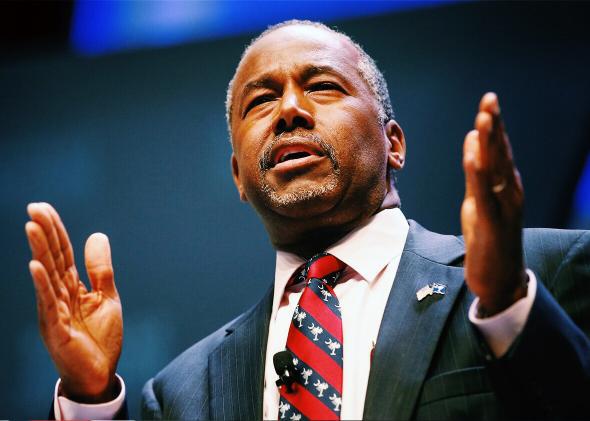The political world is once again perplexed by a comment from a Republican presidential candidate expressing an untoward view of Muslims. Ben Carson, who behind his easygoing demeanor is a paranoiac who sees analogues to Nazi Germany everywhere, would not support a Muslim candidate for president. “I would not advocate that we put a Muslim in charge of this nation,” he said on Sunday’s Meet the Press. “I absolutely would not agree with that.” He explained that the tenets of Islam forbid its practitioners from properly enforcing the Constitution, so that’s that.
Carson’s rival candidates sensed that the political novice had committed something in the ballpark of a gaffe. They attacked his position from different angles, many hoping to affix themselves to the outrage du jour to secure more attention for their own presidential efforts. Sen. Lindsey Graham, who has about as much support in the presidential contest as you do, encouraged Carson to apologize to the “American Muslim community” and concluded “that Mr. Carson may be a good doctor, but he is not ready to lead a great nation.” Sen. Ted Cruz hardly expressed a love for Islam, but he did note that Carson’s approach is at odds with the spirit of the Constitution. Louisiana Gov. Bobby Jindal, as usual, submitted the most hilarious take thus far. In an unsolicited statement sent to the press that whines about how the press is always nagging candidates with questions, Jindal explained that he’d be fine with a Muslim president who submits to certain conditions, such as being sworn in on a Bible.
Carson and his team aren’t sweating the modest rebukes from oxygen-deprived competitors. In fact, they’re “doubling down” on the comments, according to every political news site on the Internet.
“Doubling down” is a peculiar industrywide means of describing what’s going on here. It connotes that a candidate, controversially, is making the high-risk decision to stand by seemingly indefensible remarks. The term is misapplied here. Carson’s team, more accurately, is emphasizing his remarks.
Carson isn’t just scoring Republican primary points by showing resolve in the face of a hostile liberal media. He’s scoring points on the merits, too. His campaign is even bragging about it.
What’s the simplest way to put this? The American public is broadly hostile to Islam, and the Republican base is especially hostile. Sure, we’ve had one GOP presidential candidate overtly defend the “American Muslim community,” but that was just Lindsey Graham—and the Republican base is hostile to Lindsey Graham, too. No one else, even the candidates who won’t go so far as to affirm Carson’s stance, is going to be seen hugging the neighborhood imam anytime soon.
For evidence of this hostility: Look around. A Huffington Post/YouGov survey conducted earlier this year found that only 21 percent of the American public has either a very or somewhat favorable opinion of Islam. Fifty-five percent has either a somewhat or very unfavorable opinion. Among Republicans, 13 percent has either a somewhat or very favorable opinion, while 76 percent has either a somewhat or very unfavorable opinion. (As with many surveys, one imagines the thought process here. Muslims, you ask? You bet I view them somewhat unfavorably!) A 2014 Pew survey found that Muslims were viewed even less favorably than the dreaded atheists; an Arab American institute from the same year found that 57 percent of Republicans “doubt that Muslim-Americans or Arab-Americans would be able to perform in a government post without their ethnicity or religion affecting their work.” And not affecting their work in a good way, either.
The fellow who kicked off all of this generalized discussion about Islam was Donald Trump. Last week Trump “failed to correct” a New Hampshirite who declared President Obama a Muslim of non-American birth. The political media, then, expressed shock that Trump didn’t correct a person who represents the views of nearly half of his party, greater than half of his own voters, and perhaps Trump himself.
Trump’s own answer to Chuck Todd’s question on Meet the Press on Sunday further explained the politics underlying these alleged “gaffes.” When pressed by Todd about whether “putting a Muslim in the White House” is acceptable, Trump interjected: “I mean, some people have said it already happened, frankly.” Suffice it to say he wasn’t referring to Thomas Jefferson.
And there’s another layer to the question that flew over much of the political media’s heads. A significant portion of electorate would approach Todd’s query from a radically different understanding of the world as it is. Forty-three percent of Republicans, per the most recent CNN poll, believe President Obama to be a Muslim. That’s a lot of people. They believe that the country has already “put a Muslim in the White House,” and the experiment didn’t turn out very well. President Obama, in their minds, was unable to perform his government job without his religion affecting his work. Why else would he agree to hand Iran nukes or take it easy on ISIS? Why would we ever put another Muslim in the White House?
Perhaps we should expect more from potential presidential nominees. Well, go ahead and try that; be sure to tell the rest of us how it works out. Carson’s response was so obviously in his political self-interest that it only would’ve been surprising had he responded a different way.
